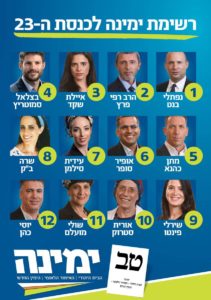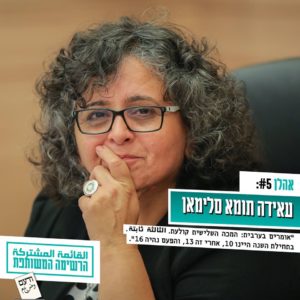Politicians, campaign managers say phenomenon linked to country’s ongoing political stalemate
They stood side by side, their backs to the Israeli parliament building, as they chanted slogans and held up placards.
“The people demand a different kind of leadership! Women’s leadership!” the placards said.
It was a sunny Jerusalem morning and a dozen or so women had gathered to protest the decrease in female representation in the political arena as the country heads next week into an unprecedented third round of elections in less than a year.
The majority of those in attendance were members of the fledgling Kol Hanashim (Voice of Women) party. It is one of the 30 running in the March 2 vote and promises to promote gender equality.
“We feel that [the country’s political leaders] have failed and that we must do this now,” Dr. Mazal Shaul, who heads party, told The Media Line.
“People ask me: Why now? They also say it’s not the right time. But it will never be an appropriate time to [establish] a women’s party,” she said.
Attendance at the protest was low – perhaps symptomatic of a wider trend in Israel that has seen women’s issues increasingly sidelined over the past year.
Amid the corruption charges looming over Prime Minister Binyamin Netanyahu − the country’s longest-serving leader − and with no party able to form a coalition after the previous two elections, many parties on the Left and Right have merged. As a result, several women are now lower down on candidate lists, and for the first time in over a decade, none of the major parties is headed by a woman.
Moreover, Israel’s three largest parties or electoral lists − Blue and White, Likud and the Joint List – have only two women each among their top 12 candidates.

This Blue and White poster highlights some of the centrist alliance’s female candidates, although it has only two women in the top 12 positions. (Facebook)
Ultra-Orthodox parties have no female representation at all. Other parties fare better, though, including the right-wing Yamina alliance, which has an even male-female split in its top 10 spots, as well as Labor-Gesher-Meretz on the Left, which has four women.
Yet with fewer women leading the charge, the 23rd Knesset could see a dearth of female representation in key cabinet positions and on powerful legislative committees.
Shaul, who is also the executive director of WePower, a non-partisan NGO that promotes female leadership in the public and political arenas, calls the current political landscape “a closed men’s club” and believes that the Voice of Women party is the answer.
“This is a very diverse party,” Shaul, who holds a PhD in chemistry, told The Media Line. “We have 100 women [on our list] from the Ethiopian, Jewish Zionist and Arab [sectors], and this is very important. This is one of our messages: that we are the voice for all women.”
She points to the #MeToo movement as having been a signpost in establishing the party.
“We felt that the public was ready for [female] leadership, but there has been a decrease in the numbers [of female candidates],” she said. “The two big parties that are now running for the Knesset didn’t include enough women on their lists. I’m not waiting for somebody to invite me to join the big parties. I’m taking [over] the space myself.”
Dr. Elana Sztokman, who chairs the Voice of Women party and is No. 4 on its list, has been involved in advancing gender equality in Israel for more than 25 years.
Originally from New York, Sztokman, an anthropologist by training, immigrated to Israel in 1993 and now lives in the central city of Modi’in. She believes that female politicians are better at problem-solving, creativity, multitasking and compromise.
“There is definitely a negative trend happening here at the top,” she told The Media Line. “[But] at the grassroots level, the opposite is happening: More women are taking an interest. More women are driven, have vision and leadership [capabilities] and want to get involved. So we’re bringing these two trends together. We’re activating the women in the field in order to bring them to the top, where change is needed.”
Parties Battle Voter Fatigue
As the latest election cycle drags out, mobilizing voters is a major concern for many parties, and Jeremy Saltan, the English-language campaign manager for Yamina, said the main issue at the moment is voter fatigue.
“We’re in a third election [in 11 months] and this is uncharted territory,” Saltan, who immigrated to Israel from Chicago in 1995 and lives in Mevaseret Zion, west of Jerusalem, told The Media Line. “There’s a lot of fear that people will not come out to vote, and most of the effort is [aimed at that].”
Another factor that has shifted campaign strategies is the number of parties expected to make it past the electoral threshold, which is set at 3.25%, or some 144,000 votes. Whereas the first round of voting last April saw 11 parties make it into parliament, this time around, following mergers on both sides of the political spectrum, only eight parties are expected to do so.
“There are a lot of people who don’t feel that they have a political home anymore,” Saltan asserted, adding that Yamina has made a special effort to reach female voters.
“The women’s vote is up for us,” he said.
Notably, Yamina’s posters and social media campaigns have featured women, with six of its top 12 candidates being female. Special emphasis is placed on former justice minister Ayelet Shaked (No. 3 on the list), former member of Knesset Idit Silman (No. 7), Sara Beck (No. 8), Shirley Pinto (No. 9) and former MKs Orit Strook (No. 10) and Shuli Mualem (No. 11).

A Yemina poster shows Ayelet Shaked (at No. 3), former member of Knesset Idit Silman (No. 7), Sara Beck (No. 8), Shirley Pinto (No. 9) and former MKs Orit Strook (No. 10) and Shuli Mualem (No. 11). (Courtesy)
Saltan cautions, however, that if the major parties fail yet again to form a government, leading to a fourth election, he expects the number of female legislators will continue to decline.
“The campaign trail is very difficult on any person, man or woman,” he explained. “It’s no secret that many women have additional responsibilities, and in that way, for women it’s more draining to do election after election.”
He says that many of the women in the party have small children.
“I think it’s unfortunate, but that’s what happens when you have three elections in a calendar year, where you’re just going at a grueling pace from morning until night,” he said.
Others argue that there is more than just campaign hardships behind women losing out in the competition.
Aida Touma-Sliman, an MK for the mostly Arab Joint List, argues that right-wing and militaristic discourse are in fact behind the negative trend.
“When the current political climate is very much encouraging the participation of army veterans and chiefs of staff, this leads to fewer women,” Touma-Sliman told The Media Line. “Women cannot contend with or really take part in this kind of atmosphere.”

A Joint List campaign photo of Aida Touma-Sliman (Facebook)
The Joint List, an alliance of four Arab-majority parties, came in third place in September’s election, winning 13 seats behind Blue and White (33) and Likud (32).
“Generally speaking, the right-wing parties have not had a good record with female representation,” she added. “The Joint List, on the other hand, is a breath of fresh air… because there is an opportunity to have four female candidates from the list elected. There are two new female candidates, at numbers 14 and 15.”
According to Touma-Sliman, who was born in Nazareth to a Christian family, it has been particularly challenging to get Arab women involved in the political process due to social and cultural issues in the community. Nevertheless, she says that “more Arab women are involved and do want to have an impact. Therefore, a large percentage will come out and vote.”
Social Issues Not the Priority
After the votes were tallied last September, women held only 28 out of 120 parliamentary seats (23%). In comparison, the OECD average for female representation stands at roughly 31%, with Mexico topping the list at 48%. In addition, just 18 out of the 246 cabinet members in Israel’s history have been women.
Michal Gera Margaliot, executive director of the Israel Women’s Network, told The Media Line that while the country has reached significant milestones over the past decade, social issues have taken a backseat to ousting Netanyahu.
“These rounds of elections are a lot about Netanyahu and about things that are not really important,” Margaliot said. “Our issues − women’s rights and gender equality − were pushed aside.”
Among the contributing factors, she said, are the fact that most campaigners are men and most Israelis vote based on security or political ideology. Social issues such as gender equality, education or healthcare are not a priority.
“We do know that if you don’t pay attention to gender equality, the ‘default state’ is masculine,” Margaliot asserted. “We’re not in a place where we can just let [the issue] go and then see half of the parliamentary seats go to women.”
She also says women must be involved in the post-election process of forming governing coalitions.
“We demand that women [be included] in the negotiation teams for coalition-building, of which there were none or almost none in the past rounds,” she said. “We demand fair representation in the government.”